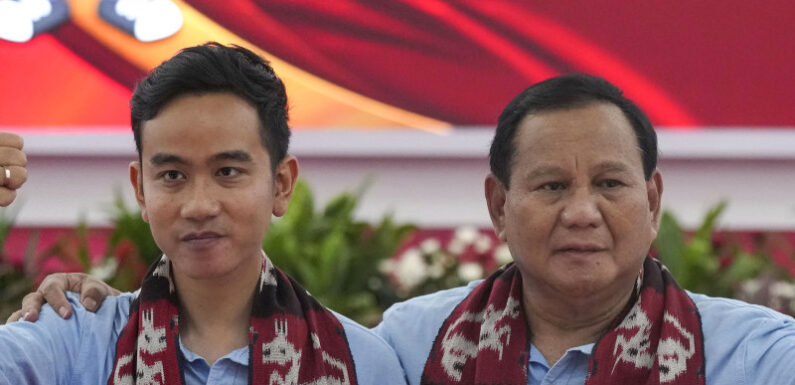
Save articles for later
Add articles to your saved list and come back to them any time.
While Australia’s diplomatic focus may be squarely focused on the unfolding violence in the Middle East right now, another potential long-term headache is gaining steam much closer to home as the Indonesian election draws closer, and Joko Widodo – known as Jokowi – being succeeded by an unpredictable former general looking increasingly likely.
Presidential candidate Prabowo Subianto (right) and his running mate Gibran Rakabuming Raka, the eldest son of President Joko Widodo, wave at the media after registering their candidacy in Jakarta on Wednesday.Credit: AP
While the leading presidential candidates have been known for some time, there’s been months of horse-trading around running mates. But the candidates have now been forced to play their hands with formal registrations recently closing. With it came the biggest clue as to which horse Widodo will be backing come election day in February 2024.
Currently serving as defence minister in Widodo’s government and a member of the Gerindra Party, Prabowo Subianto’s has a chequered history. With a reputation for being unpredictable and temperamental, Prabowo has spent the past five years rehabilitating his image from rabble-rousing demagogue to responsible senior cabinet minister.
Casting further back to his time in the special forces, Prabowo was banned from entering the US for 20 years due to allegations stemming from Indonesia’s occupation of Timor-Leste and the violence that followed the downfall of Suharto. Despite all this, he’s still considered well-disposed to the West. Now gaining ground with younger Indonesian voters, he’s now seen as the most likely successor.
Currently, his closest challenger is Central Java Governor Ganjar Pranowo, who hails from the same party as Widodo, and whose platform is largely based on continuing his predecessor’s policies. Former Jakarta governor Anies Baswedan is also popular among voters, but the consensus is that any votes cast his way would flow to Prabowo in a second round.
For months now, the biggest question for many has been which candidate Widodo would back. Given he retains enormous popularity, his backing would give either candidate a decisive advantage over the other. Any assumption that the president would back his party’s candidate was smashed last week when Prabowo named Widodo’s eldest son, 36-year-old son Gibran Rakabuming Raka, as his running mate.
Now his third run at the presidency, partnering with Gibran, who has served as mayor of Surakarta City since 2021, may be Prabowo’s last real shot at taking office. For Widodo, it’s also a big step towards creating a new political dynasty.
Widodo and his allies – which includes his brother-in-law, chief justice Anwar Usman – have put much effort into clearing away any political and legal obstacles to Gibran’s candidacy. Though historically, vice presidential or presidential candidates are required to be aged over 40, a court ruling earlier this month determined a special exception could be made if a candidate had previously held an elected position in a regional office. Gibran’s uncle, Anwar Usman cast the deciding vote in the ruling.
Publicly, a Prabowo presidency would appear to offer Indonesia and Australia more of the same: populist policies, economic nationalism and hedging between the United States and China.
With political turbulence ahead in the US and China carrying greater risk, Indonesia is an increasingly attractive alternative for businesses. Economic fundamentals will likely remain strong and the International Monetary Fund has forecast growth at 5 per cent in 2023 and again in 2024, with inflation coming under control.
President Joko Widodo visited Australia earlier this year in Australia.
The significance of the relationship between Indonesia and Australia cannot be overstated and continuing a long-term allyship amid global political shifts is arguably more important now than ever before.
To ensure the best outcomes for Australia, Canberra will need to carefully manage any bilateral irritants.
Deputy Prime Minister Richard Marles has met Prabowo several times and has hopefully nurtured a close relationship with him. But the low-key engagement with Prabowo in his capacity as defence minister will be much harder to sustain if he becomes president, inviting with it the attention of the media, activists and far greater scrutiny.
Equally important to Australia will be its relationship with Gibran, a man mirroring his father’s trajectory with a stint in small business before entering local politics. He appears confident on the public stage and sounds much like his father. But he’s untested on national politics and international affairs.
There is no shortage of challenges for Australian businesses to navigate. For starters, democracy in Indonesia does not look the same as it does in Australia. Business and government are much more closely intertwined in Indonesia than they are here. Corruption, regulatory uncertainty and sovereign risks persist, but the booming consumer population and young labour force make Indonesia an increasingly attractive partner nation.
If Prabowo wins, he will be 73 years old when he takes office and, assuming he serves a full five-year presidential term, nearing 80 by the next election. Though not confirmed, this could well be Widodo’s gamble and the reason behind pairing his comparatively young son with Prabowo over a fellow party-mate candidate like Ganjar Pranowo.
Prabowo is also backed by a formidable coalition of parties. Knowing this, and potentially using it to his advantage puts Widodo one step closer to creating a new political dynasty for Indonesia.
Robert Law is the director of advisory and insights at Asialink Business and a former Department of Foreign Affairs and Trade officer.
The Opinion newsletter is a weekly wrap of views that will challenge, champion and inform your own. Sign up here.
Most Viewed in World
From our partners
Source: Read Full Article

